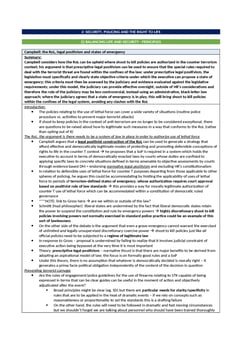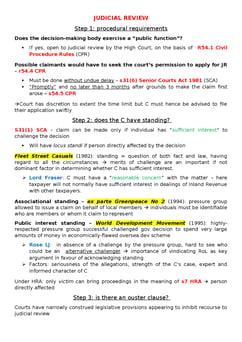Entick v Carrington [1765] 19 St Tr 1030
Judgement for the case Entick v Carrington
Table Of Contents
KEY POINTS
To enter a person's house and search it, government agents need a valid search warrant based on probable cause.
Lord Camden:
If this is law, it would be found in our books, but no such law ever existed in this country. Our law holds the property of every man so sacred that no man can set his foot upon his neighbour's close without his leave.
FACTS
The defendants forcibly and without the plaintiff's consent entered the plaintiff's dwelling house. During this search, they read, pried into, and examined the plaintiff's private papers and books, making the plaintiff's confidential affairs public.
The defendants claimed that their actions were justified as they had a warrant issued to them by the Earl of Halifax “acting as Secretary of State.” There exists no law granting such authority to the Earl of Halifax.
This warrant directed them to conduct a search for the plaintiff, who was believed to be involved in the writing of seditious papers criticising the government. The plaintiff averred that, regardless of the justification claimed by the defendants, they had still committed trespass against him, and thus, they should not be absolved from liability.
JUDGEMENT
Judgement for the plaintiff.
COMMENTARY
This landmark case emphasised the value of private property, the requirement for valid warrants in searches and seizures, and the protection of private documents against governmental encroachment.
In many democratic cultures, the evolution of privacy rights and legal concepts has been significantly influenced by its lasting legacy.
ORIGINAL ANALYSIS
Plaintiff sued two king’s messengers who unlawfully broke into his house and stole his papers. Defendants said they were authorised to by a warrant from a minister which ordered them to bring Plaintiff and his papers to the minister, the Secretary of State saying that it was essential to government that such warrants be permitted.
However court said that in absence of precedent or statute giving crown right to issue such warrants, they could not be issued.
Court said necessity doesn’t give them the right to legislate (i.e. by assuming powers) and that there is no distinction between crimes committed by the state and other crimes.
For Further Study on Entick v Carrington
Need instant answers? Our AI exam tutor is here to help.
Ask questions 🙋 Get answers 📔 It's simple 👁️👄👁️
Our AI is educated by the highest scoring students across all subjects and schools. Join hundreds of your peers today.
Get StartedSimilar Cases
Related Product Samples
These product samples contain the same concepts we cover in this case.
| Criminal Justice, Security, & Human Rights | Fair Trial Rights And Secret Evidence Notes (117 pages) |


 Since 2010, Oxbridge Notes has been a trusted education marketplace, supplying high-quality materials from top achievers at universities like Oxford, Cambridge, LSE, Harvard, and Yale.
Since 2010, Oxbridge Notes has been a trusted education marketplace, supplying high-quality materials from top achievers at universities like Oxford, Cambridge, LSE, Harvard, and Yale.